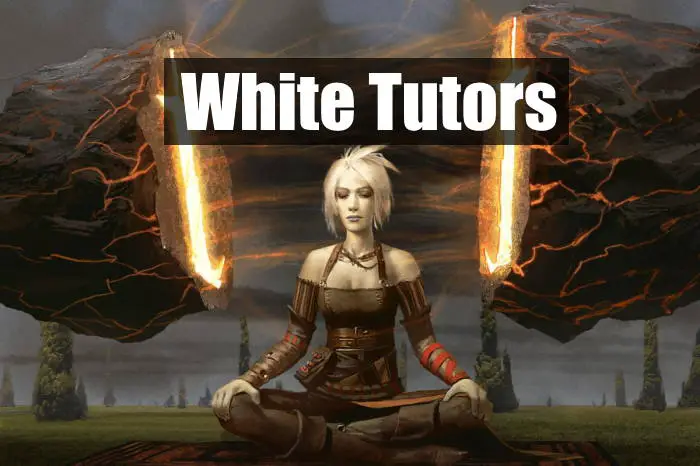There’s no worse feeling in Magic than drawing dead cards for turn after turn after turn. Since white is the worst color for card advantage, it really needs to make every card count. Luckily, white has a diverse suite of powerful tutors.
Although white tutors can be narrow individually, they offer you many options as a whole. Collectively, white tutors can find every nonland permanent type. As a result, white is one of Magic’s most versatile colors for tutors. However, this also means you need to be mindful about which tutors would function well in your deck. Steelshaper’s Gift may be a powerful card, for example, but it only works when your deck has key equipment that you’ll always want access to.
With so many diverse options, it can be difficult to know which cards are a good fit for your deck. Let’s take a look at what white tutors can offer you, as well as go through the best of the best.
Pros and Cons
| Pros | Cons |
| Efficient | Narrow individually |
| Versatile as a whole |
Which Card Types Can White Tutors Find?
White tutors can find every nonland permanent type, including:
- Artifacts
- Creatures
- Enchantments
- Planeswalkers
This variety means that if you’re playing a white deck, there’s probably a tutor that would work well with your strategy. Of course, you still need to look for the right one. No white tutor can search for all of these card types, so you’ll need to identify which cards in your deck are the most important to your gameplan.
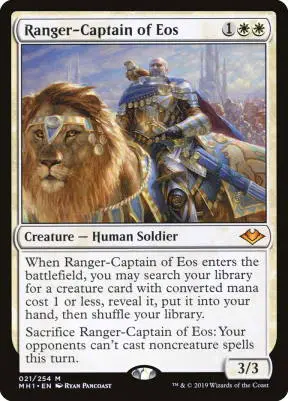
You should also remember that plenty of white tutors are narrow. Some tutors can only look for certain subtypes, for instance, or they may have other restrictions for what they can find. These cards can still be strong in the right deck, but you’ll need to make sure you have enough relevant targets to include them.
What Makes White Tutors So Strong?
White has some of the most efficient tutors in the game. Many of the color’s strongest tutors cost two mana or less, and they still have plenty of solid options at three and four mana.
One of the most important qualities for a tutor is its efficiency. Cheap tutors make it more likely that you’ll have enough mana to find what you need and immediately play it. They also allow you to find your key cards during the early game. If you only need to spend one or two mana to find your best card, you can quickly put it into play and start getting value from it.
Many white tutors also put cards directly onto the battlefield. Adding a card to your hand is already strong, but cheating it into play is even better. Not only does it give your opponents fewer options to stop you, but it also lets you spend your mana on other spells. Putting cards into play for free is one of the best things you can do, and a fair number of white tutors let you do just that.
When Should I Run White Tutors?
It can be difficult to know if your deck would benefit from tutors, especially from some of the narrow ones. If you decide to play Stoneforge Mystic, for example, how many equipment do you really need? And should you only play that card in equipment-matters decks?
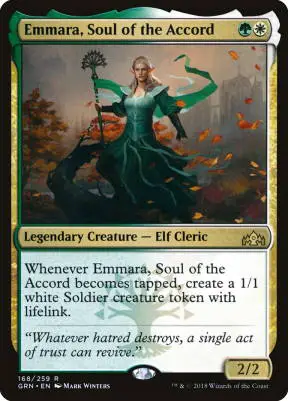
You might be surprised to learn that these tutors can pull their weight even if you only have a few cards for them to find. In The Command Zone’s deck tech for Emmara, Soul of the Accord, Josh Lee Kwai explains that he runs multiple tutors just to find Skullclamp (they discuss this around 41:40). These tutors can get some of his other good cards, but they’re usually just finding Skullclamp.
This case is unique, though, because the card advantage you get from Skullclamp negates having a dead card if you happen to draw one of these tutors. Still, I think this shows that you only need a few powerful targets to make your tutors work. Even with just three to five viable options, a tutor can be useful whenever you draw it. After all, you’re probably getting the same one or two cards with your tutors anyway.
We run tutors to add consistency to our decks, so you don’t need ten, fifteen, or even more targets for tutors to be strong. As long as your tutors can find your best cards, they’ll make a great addition to your deck.
What Are The Best White Tutors?
No matter what card type you’re looking for, you’ll have at least a few options to choose between. In casual decks, most white tutors will work just fine. If you’re looking to optimize your deck, however, you’ll want to run the best of the best. Listed below are the strongest white tutors organized by what card type they can find.
Artifact Tutors
Oswald Fiddlebender is essentially a Birthing Pod for artifacts, but it can come out very early in the game.
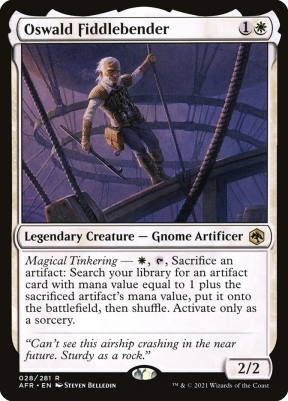
For just two mana to cast it and one to activate its ability, Oswald is an efficient, repeatable tutor. If you’re playing EDH, you can even play it as your commander. Having consistent access to this effect is a powerful way to start the game.
RELATED: MTG Commander: The Ultimate Guide
Oswald’s biggest downside is that you have to wait a full turn to activate its ability. If you don’t have a way to protect it, your opponents might remove it before you get anything. I’ve had opponents spend early removal to me from going up the chain right away, and it definitely slows me down.
| Pros | Cons |
| Efficient | Doesn’t tutor right away |
| Tutors to battlefield |
If you’re looking for an efficient, one-shot effect for finding artifacts, take a look at Enlightened Tutor. Not only does it find artifacts, but it can also find enchantments. This makes it white’s most flexible tutor, and most white EDH decks could probably make good use out of this.
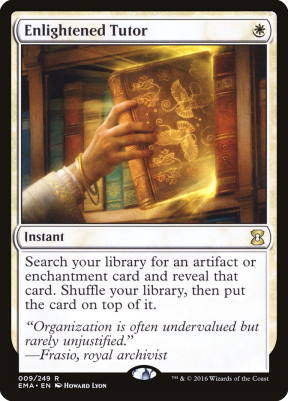
Putting the card you search for on the top of your library isn’t ideal. However, you can cast this on the end step before your turn to get the card right away. You’re still losing card advantage, but the guarentee of drawing one of your deck’s key pieces is worth it.
| Pros | Cons |
| Efficient | Tutors to top of deck |
| Flexible | |
| Instant |
Creature Tutors
When it comes to creature tutors, white only has a few options to choose between, and they’re all restrictive. White tutors limit you to small creatures, but that still leaves you with some solid cards.
Recruiter of the Guard is my personal favorite for creature tutors in white. Other options, like Ranger of Eos, limit you to creatures with a mana value of one or less. Recruiter of the Guard is still restrictive, but it gives you more choices than the competition.
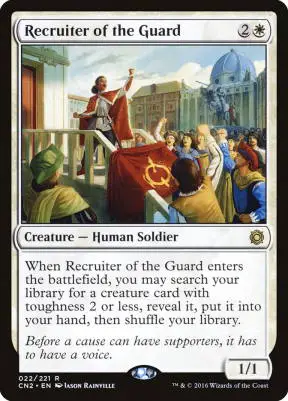
There’s actually quite a few creatures will low toughness but high impact. Esper Sentinel, Sram, Senior Edificer, or Mesa Enchantress can give you tons of card advantage. You could slow down your opponents with cards like Grand Abolisher or Thalia, Guardian of Thraben, and you can even find a well-known combo piece by getting Karmic Guide.
RELATED: MTG Infinite Combos: An Ultimate Guide
It may seem too specific to really work, but Recruiter of the Guard can shine in the right deck.
| Pros | Cons |
| Efficient | Narrow |
Enchantment Tutors
Academy Rector is a really interesting card. It doesn’t tutor right away, so you have the opportunity to wait and see what you need. Once you know, putting an enchantment right onto the battlefield is extremely strong.
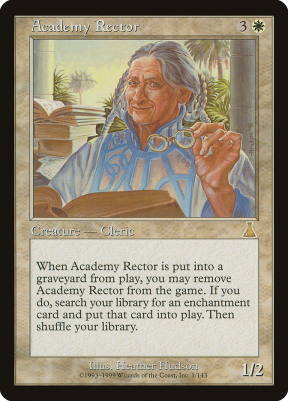
Still, there’s a lot that can go wrong with Academy Rector. First, you need to find a way to kill it. Your opponents won’t send this to the graveyard unless they absolutely have to, so you’ll need some setup. Personally, I wouldn’t run this card unless my deck had a few sacrifice outlets.
In fact, aristocrats strategies have plenty of uses for Academy Rector. Some of my favorite enchantments to fetch up are Black Market and Grave Pact, but you can also get The Meathook Massacre if you need a Blood Artist effect.
You also need to watch out for exile effects. If this card doesn’t hit the graveyard, or if your opponents exile your graveyard in response to its ability, you’ll get nothing. Paying four mana for a 1/2 with no extra value feels pretty bad.
| Pros | Cons |
| Tutors to battlefield | Requires setup to tutor |
| Vulnerable to exile |
We’ve already discussed Enlightened Tutor, and it’s a great option whether you’re finding artifacts or enchantments. If you run this card, just make sure to either pair it with card draw or time it well. The last thing you want is for your opponents to have lots of time to answer your tutor effects.

| Pros | Cons |
| Efficient | Tutors to top of deck |
| Flexible | |
| Instant |
Equipment Tutors
Next, we have our cheapest tutor: Steelshaper’s Gift. This card’s low cost is excellent, but its effect is somewhat niche.
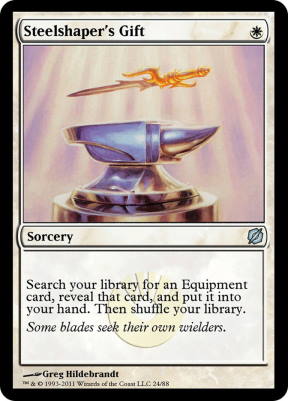
Still, you don’t have to play tons of equipment to make use of Steelshaper’s Gift. Strong equipment cards like Skullclamp, Sword of Feast and Famine, or Sunforger can work in lots of different decks. These can be some of your best cards, so you’ll want access to them as often as possible.
| Pros | Cons |
| Efficient | Narrow |
Stoneforge Mystic is also a great way to find equipment. It might require more mana than Steelshaper’s Gift, but it has a higher upside. If you can use its activated ability, you can cheat the mana cost for any equipment in your hand. We’ve already discussed how strong getting cards for free is, and this card will save you lots of mana in the long run.
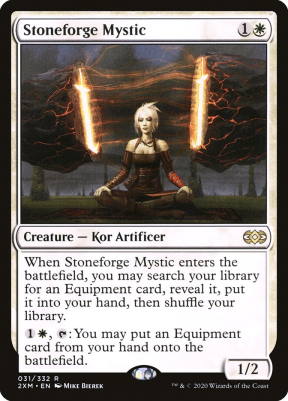
Stoneforge Mystic is one of my favorite cards for equipment decks. When I see this in my opening hand, I know that I’ll have solid plays for the first few turns, regardless of what I draw.
If you don’t have any other creatures, it can even suit up with what it tutors for. It might not excel in combat alone, but just about any creature is threatening when it has Sword of Feast and Famine attached to it. This is an all-star for equipment decks, and I highly recommend finding a slot for it.
| Pros | Cons |
| Efficient | Narrow |
| Tutors to battlefield |
Planeswalker Tutors
It shouldn’t surprise you that Arena Rector is my pick for the best planeswalker tutor. After all, its design was inspired by Academy Rector, which also made the list.
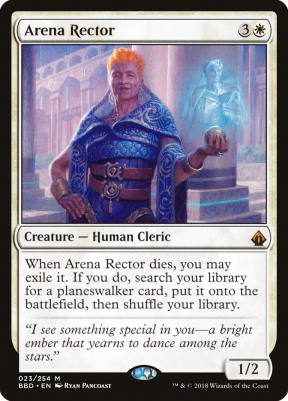
Arena Rector shares all of the benefits and drawbacks of its scholarly predecessor. The two have the same mana cost, the same stats, and even the same creature types. The only difference between them is what card type they can find.
Of course, that’s an important difference, and you need to be mindful of how planeswalkers work to maximize this card’s potential. Most planeswalkers are only useful on your turn, so you’ll likely want to sacrifice Arena Rector during one of your main phases, or on the end step before your turn.
That way, you can get immediate value from what you tutor for. Unless you’re getting The Wandering Emperor or Teferi, Master of Time, it’s best to wait. Getting a planeswalker on your opponent’s turn just gives them more time to find an answer.
| Pros | Cons |
| Tutors to battlefield | Requires setup to tutor |
| Vulnerable to exile |
End Step
White has some of the most diverse tutors in Magic. You might not be able to find any card, but there are good options for finding most card types. I hope you found what you were looking for and that you’ve learned something new about one of the best effects in the game.
